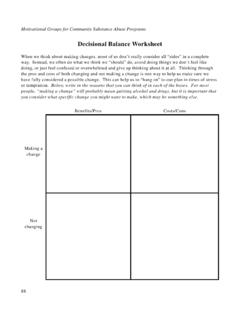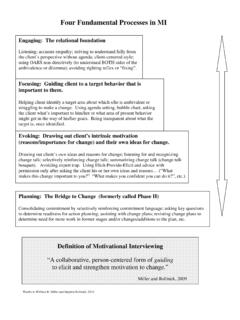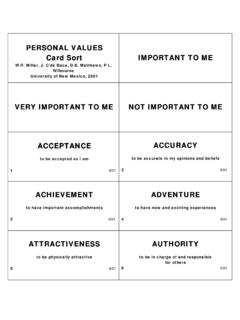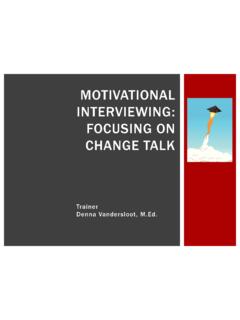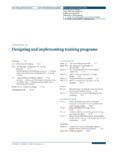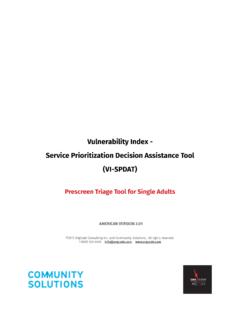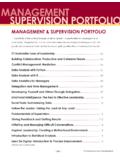Transcription of TNT Manual 2014 D10 20150205 - Motivational …
1 1 Motivational interviewing Training New Trainers Manual Attribution-ShareAlike International (CC BY-SA ) 2 Motivational interviewing Resources for Trainers From the Motivational interviewing Network of Trainers Updated: September, 2014 In science. when you begin to get somewhere, you find that the principle is quite simple but has enormous implications and is not easy to discover. I feel that we have made progress in client-centered therapy in approaching some of the truth of what happens in the process of change and how it can be facilitated. And to try to help people to grasp that and begin to try it out, experience it, and finally come to live it in more than just the therapeutic hour that s what training is all about. - Carl Rogers from C.
2 R. Rogers & D. E. Russell (2002). Carl Rogers: The Quiet Revolutionary. Roseville, CA: Penmarin Books, p. 275. There is no such thing as teaching; only learning. - Monty Roberts _____ Welcome to this training Manual from the Motivational interviewing Network of Trainers (MINT). The primary mission of MINT is to promote the quality of training and practice of Motivational interviewing . Toward that goal, this Manual provides a variety of training ideas, specific exercises, metaphors and activities all designed to help learners understand the spirit and practice of Motivational interviewing . Most of these training ideas were originally designed for a workshop format, but many are also suitable for individual training and supervision as well. This Manual was compiled through the generosity of MINT trainers, who volunteered their ideas without restriction or compensation.
3 In that same spirit, this Manual is offered as a free gift for potential trainers or supervisors of Motivational interviewing . Any sale or duplication of this Manual is prohibited. We ask that you provide proper attribution when you quote or use this Manual . This Manual organizes training methods by content areas with which they are often used. Most of the training exercises described in this Manual , however, can also be used flexibly in learning other content and aspects of Motivational interviewing . Best wishes as you move forward in your training and supervision of Motivational interviewing ! The Motivational interviewing Network of Trainers 3 Helping Others Learn Motivational interviewing (MI) When Steve Rollnick and I began training MI trainers in 1993, our approach was simplistic and, in retrospect, embarrassingly prescriptive: Here s the way to conduct a workshop on MI.
4 Soon afterward we began to write about the underlying spirit of MI that should guide good practice: acceptance, partnership, evocation and compassion. It was a short but important step to realize that this same spirit should guide us when helping people who want to learn MI. As we began to study the process of learning MI, it became apparent that a training workshop is only a beginning. In the first evaluation of my own 2-day MI workshop, we found from pre- and post-training recordings of actual practice that participants had changed very little in how they counselled. There was some evidence that they had received training a few more reflections than before, but by and large there was little difference in what they actually did in practice, certainly not enough to make any difference to their clients.
5 Worse, we found that after the training participants were somewhat less interested in learning more about MI. Why? Because we have already learned it! We had persuaded them that they now knew MI and were practicing it. Yet on recordings of practice there was very little evidence of it. Obviously something was wrong with our training model. Why had we ever expected that a one or two-day class would change practice behavior? We were using a dispensing model: I have what you need, and I m going to give it to you. Subsequent research supported the limited impact of classroom training, even with lots of practice included. Just reading about MI and watching videotapes has still less impact on practice. MI is a complex skill, like playing a musical instrument. Watching others play the piano or attending a two-day workshop is not likely in itself to turn one into a competent pianist.
6 Good research teaches you to ask better questions. Now we had a puzzle: What does it take to help someone develop skilfulness in MI? You can learn about a complex skill by reading about it, watching demonstrations, or talking a class, but mastery takes practice, practice, practice. Furthermore, practice without reliable feedback is unlikely to produce much learning. Imagine playing a keyboard without sound, practicing archery in pitch black darkness, or taking on-line practice tests but never finding out whether your answers were correct. To help someone learn, a coach must be able to observe. The tennis coach has to watch you practice; the violin teacher must listen to you play. We soon found that even a modest amount of expert feedback and coaching after a workshop substantially improved proficiency in MI. What you have here in this Manual is a toolbox.
7 It contains a set of training resources that have been developed and tested by MINT members over the years as tools for helping others develop skill in MI. Some of these will work well for you and some will not. Like MI, you must try them out, practice them, and make them your own so that you don t feel like you are using someone else s bag of tricks. The goal is to help people get better at a particular way of being with others that facilitates change. Here are a few things I ve learned along the way: As a trainer of MI, I should be manifesting the very same way of being that I hope to convey. Affirm all steps in the right direction. Listen carefully. Recognize that people are the experts on their own context of practice. People learn better from real play than from role play. There is something artificial 4 about pretending to be someone you re not, and I find that counselors and even professional actors don t usually behave as real clients do.
8 When the task is to talk about oneself while experiencing MI, both parties learn more. Be ready to demonstrate good practice on the spot. It doesn t have to be perfect. It s more credible if you have to struggle a bit. The goal is learning, not awe or accolades. The skills of good listening (accurate empathy) are fundamental in MI. Until empathic listening becomes comfortable and natural it s difficult to go much further because everything else in MI builds on good listening. Without the person-centered way of being described by Carl Rogers, MI is hollow. People learn in different ways and at different rates. With any single learner, the question I ask myself is, What does this person need next? If you make fourteen suggestions, probably none will be implemented. Emphasizing what someone did wrong also doesn t help much.
9 What is the next positive step in learning for this person? Be patient with your learners and with yourself. Learning a complex skill like MI is a process that necessarily happens over time. You can t push in skill. Workshops are only a beginning. If people go away from an initial workshop understanding more about MI and knowing whether they want to put in the time and effort needed to get better at it, I figure I have done my job. MI is not for everyone. It is one tool that can be helpful when working with people who are ambivalent or reluctant about change. I think it is best used by people who feel naturally drawn to it, who recognize it, in a way. It has to be OK for people to decide that it s not for them, or that they don t want to take the time to learn it.
10 Finally, helping people learn MI is a privilege, and I appreciate those who allow me to assist them in learning it. So many professionals find it interesting, engaging, even fun and liberating. It is learning together more about our human nature. Enjoy! Bill Miller 5 Table of Contents Motivational interviewing Training New Trainers 1 Process of training .. 9 Designing .. 9 Eight Tasks in Learning Motivational interviewing .. 11 Levels/Types of Training in Motivational interviewing .. 12 Pre- Training Screening .. 13 Helpful Responses Questionnaire .. 14 Workshops and Ongoing Learning .. 16 Icebreakers / Opening Strategies .. 17 Structuring .. 18 Readiness Ruler Lineup .. 19 Three in a Row.


